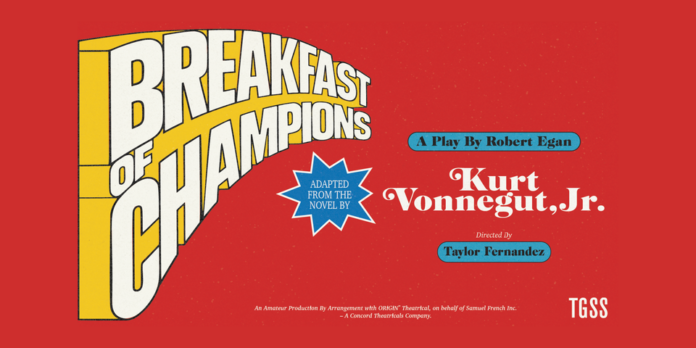The University of Adelaide’s Theatre Guild Student Society (TGSS) has a mission to present “experimental and progressive student theatre”, and its current production of Robert Egan’s adaptation of the novel “Breakfast of Champions” by Kurt Vonnegut, Jr. fulfils that aim by the bucket load.
The production marks the directorial debut of Taylor Fernandez, an English major at the university and a Theatre Guild board member, and she is clearly someone to watch out for. Successfully taking “Breakfast of Champions” from the page to the stage is an enormous challenge, even for someone with extensive experience, and Fernandez has approached the daunting task with intelligence, daring, and style, and has come up trumps. The production is not perfect, but it’s impressive.
“Breakfast of Champions” is not easy theatre to enjoy and requires the audience to invest heavily. Its style, like the parent novel, is idiosyncratic and of the metafiction genre, where the ‘fourth wall’ is often broken. Performers often talk in the first and third person, as fictional characters and as narrators, resulting in the audience developing a relationship with the characters and the text. Indeed, as the audience first enter the auditorium at the very start, we observe a single actor on stage working at a typewriter pensively committing thoughts to paper. What’s he writing? Who is he? The program states he is ‘The Author’, but is he Vonnegut, or a fictional character created by Vonnegut/Egan? The complex relationship between audience and the play and its characters is established, and for the next two hours it becomes deeper and increasingly self-conscious. Phoenix Scriver’s lighting design included the use of a gentle full wash throughout the play that illuminated the audience as well as the playing area, and this assisted the cast breaching the fourth wall.
The plot borders on the absurd, and follows Dwayne Hoover, a Pontiac dealer, who is psychotic because of “bad chemicals in his brain”, and eccentric science-fiction novelist Kilgore Trout. Hoover reads one of Trout’s novels which persuades him that everyone is a robot except himself. They eventually meet at an arts festival to which Trout, to his surprise, is invited to appear, and the consequences are extreme as Hoover takes his final plunge into insanity creating mayhem on the way.
Set in a fictional town in the USA, the action is frequently episodic, traversing a dizzying and seemingly random sequence of locations and characters. Vonnegut addresses a multiplicity of themes – race relations, suicide, free will, sexuality, gender stereotypes, economics, and more – and Vonnegut takes multiple swipes at American society on the way and slaughters one sacred cow after another. But are they sacred, and if they are, why? The text is fast flowing, sometimes dense, often funny, and it can be confusing.
Fernandez’s first challenge was to recruit a versatile cast. They total fourteen in number, with three in lead roles and eleven playing significant supporting ensemble roles. They all have varying degrees of experience – from novice, to accomplished – and they all perform with incredible passion. The sense of ensemble is a strong part of the production.
Robert Baulderstone plays The Author with style, and gives him a degree of inscrutability, which is needed to ensure he can comfortably breach the fourth wall as needed.
Tommy Raets plays Hoover and establishes his troubled psyche from the very start. He sustains and develops this throughout, and his near final restaurant scene in which he remains silent for such a long time is a fine example of using body language alone to create palpable meaning. It was hard not to look at him.
Beatrice Blackwell (he/they) is exceptional as Trout. Their third person narration is attention-grabbing, and, in the blink of an eye, gives way to chilling exposition as Trout. Hoover is clearly unhinged, but there is always doubt about Blackwell’s Trout.
All members of the ensemble create differentiated and interesting characters. Clinton Nitschke imbued Harry LeSabre with beguiling ambiguity. He has a strong voice, clear articulation, and presence. Marielle Intveld creates attention-grabbing silhouettes. Mary McAuliffe as Beatrice Keedsler radiates compassion. Henry Chipperfield gives his Milo Maritimo a sense of earnestness. Airlie Windle plays Francine Pefko with fragile vulnerability. Charlie Milne gives ‘Bunny’ Hoover repressed susceptibility. Eric McDowell plays Wayne Hoobler with dignity and likeability. Leo Chang gives the Truck Driver an air of acceptance and predestination. Connor Duncan’s Rabo Karabekian has enigmatic depth, and simmering determination. Danielle Veldstra plays Bonnie MacMahon with quiet determination. Chris Best’s Eldon Robbins is nicely understated and played with an air of resignation.
They collaborate almost seamlessly to move the stage furnishings and various representational structural elements around the playing area. Set Designer Thomas Brogden and Properties Manager Bella Wheatland have collaborated well to produce a set that Fernandez and her cast work exceptionally well. The transitions from scene to scene are well-rehearsed and choreographed. It’s poetry in motion. To a person, the off-dialogue work is well constructed, with never a lapse in intent or execution. This attention to detail is the mark of a director who understands the text.
Because the action is episodic, fast-moving, chaotic, and absurd at times, the success of the show arguably turns on the ability of actors successfully exaggerating characters without becoming melodramatic, strongly articulating dialogue, and briskly transitioning from one setting to another. In the main this was achieved, but perhaps the previously mentioned full lighting wash caused some of the cast to insufficiently differentiate between when they were in the confines of the set and when they were beyond the fourth wall.
“Breakfast of Champions” is a creditable production of what is a difficult play.



